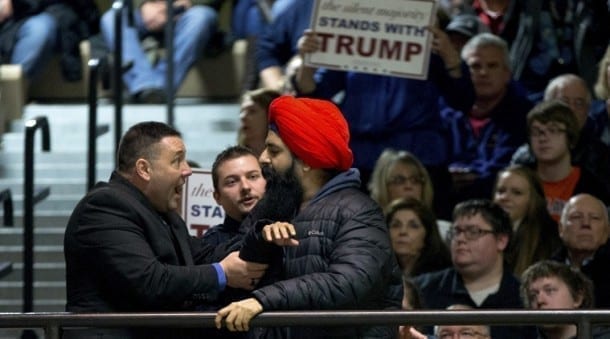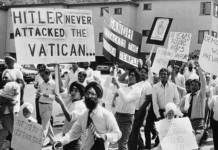


Sikh protester Arish Singh was ejected from a Donald Trump campaign rally in Iowa on Sunday, January 24, after attempting to display a “Stop Hate” banner. As Singh was being removed by security, Trump repeatedly called, “Bye bye!” after him, and then asked the crowd, “He wasn’t wearing one of those hats, was he?”
In the aftermath, media outlets and Twitter users worldwide argued whether Trump had made an offensive comment about Singh’s Sikh turban, or if Trump – who pointed to another rally-goer’s “Make America Great Again” baseball cap during his remark – was merely declaring that Singh “never will” wear a Trump hat.
Video showed the crowd chanting “Trump! Trump! Trump!” while Singh was physically pushed by a Trump staff member and then escorted out by police to the crowd’s ecstatic cries of “USA! USA! USA!”
Most campaigns attract protest; however, for Trump, protests have not simply been a disturbance to be avoided, but have instead developed into part of the spectacle, proof of Trump’s nativist promise to protect his supporters from “dangerous” outsiders.
At the start of each rally, the specter of protest is invoked, much like a terrorism warning at an airport. Attendees are told “not to harm a protester” but instead to chant “Trump! Trump! Trump!” to alert security to the problem.
The protesters, who have most prominently been people of color, represent the “other” in an angry ritual in which Trump goads the crowd on, encouraging his supporters’ identification of the enemy. Finally, the dissident is pushed to the exit in a frenzied foreshadowing of what Trump promises to do when elected.
Singh recently joined the ranks of these expelled “others.” The following interview discusses some of his motivations.
Dan Kugler: What led you to attend the rally and to hold that banner?
Arish Singh: There were two things that set me off. First, there was the Trump rally where they ejected the Muslim woman, who I don’t think said anything at all…. That’s not how you conduct politics. You should expect protest. And she wasn’t even being disruptive.
The other thing was these robocalls for Trump made by this white supremacist group, the American Freedom Party. There were robocalls in Iowa where the caller was saying, “We don’t need more Muslims in our country, what we need is more educated white people.” I was seeing that come up on Facebook, and people made recordings of these calls, and I was really shocked. I don’t think you could find anything really close to that as far as the kind of caucus activity that goes on every four years. It’s introducing xenophobic politics into the mainstream, and I think even more than that, Trump winds up providing cover for these groups.
Were you planning to play on the fact that people might incorrectly think you were a Muslim based on your Sikh turban?
I think it’s beyond that. If you really want to take on hate crimes against Sikhs as they happen here in the US, you can’t just take it on as simply advocacy for Sikhs. You can’t just say, “We aren’t Muslims, stop attacking us.” You need to talk about the larger problem, which is Islamophobia. You have to stand up against that.
There was a PSA, which I don’t think anyone made with bad intentions, that said something like “Don’t freak, I’m Sikh.” It’s basically saying, “Don’t confuse me for a Muslim.” And the message is: “I have this identity and it’s separate.” And I see where they’re coming from: If people started talking about Jews being Christians, I could see how someone could get irritated by that. But still, to me, that “I’m not a Muslim” sentiment doesn’t make any progress, because there should be no ostracism against either group.
The issue is not mistaken identity; it’s confronting Islamophobia. And the reason you have to confront Islamophobia is because we, as Americans, have treated Muslims as a broad enemy … it’s American policy. We went and invaded Iraq and legitimized it largely based on September 11th. We had this whole rationale of chemical weapons, but you couldn’t have had the momentum to invade Iraq without the September 11th attacks, and that kind of equivalence between all Muslims, or sometimes all Brown people, and terrorism. That’s something that at the highest level our government has done, and that’s true about Democrats and Republicans. So if you ever want to confront Islamophobia, you can’t just stop and say, “I stand with my Muslim brother”; you have to say you stand against what we’ve done in these countries, what we’ve done to these people. If you want to fight ISIS, you can’t confront ISIS without acknowledging what we did to Iraq.
Obviously, we want to move away from this mistaken identity facing Sikhs, but worse than any mistaken identity is willful deceit, which describes the equivalence of terrorism with a whole nation of people, which is what made the Iraq war possible. You have to put all this into context if you want to mitigate hate crimes or take on these issues. I think that’s more radical than many Sikh or Muslim groups would like to put it, but I think that’s really what you have to say.
Did you expect that Trump was going to get into 9/11, and did you purposely wait for that moment to unfurl the banner?
A little bit. I wanted it to have that context. It was actually really hard to hear from where we were because there was so much echo in that gym. But when he said, “Someone’s got to talk about it,” that was the moment. He did make the reference to 9/11 and then he mentioned the San Bernardino attacks, deleting all context between those events.
In November, Mercutio Southall, a Black Lives Matter activist, was beaten and choked after protesting at a Trump rally. He described the crowd as like a “lynch mob.” Afterward, Trump expressed apparent approval, reflecting that “maybe he should have been roughed up.” Southall is not the only example of a Trump protester who was assaulted by the crowd. Did you fear at all for your physical safety?
Not too much. A little bit, but they have metal detectors – no one was gonna have a gun or anything like that. I didn’t feel unsafe in that sense. There was a … Trump fan who came up as we were being escorted out who tried to physically intimidate me, but I didn’t really take it seriously.
In the video, as you are forced to leave, there’s someone who seems to be in some official role yelling at you, and you’re clearly yelling something back. What’s going on at that point?
Well, after we took out the “Stop Hate” banner, I saw the Trump official coming at us from the corner, so I knew we weren’t going to last long; I yelled out that the campaign was giving shelter to white supremacists and to right-wing extremists.
Then the Trump official was shoving me and yelling, “You have to get out of here. You have to get out of here.” He wasn’t telling me and then waiting; he was shoving me. The police officer came up kind of behind him and was saying the same thing. And then there was another person who took my friend Taylor, who had been holding the banner with me, and we were escorted out of the hall.
What sort of feeling did you get from the crowd around you as you were pushed out?
All I remember is that people were yelling “Trump!” They are trained to kind of just yell, “Trump! Trump! Trump! Trump!” They all immediately started yelling it like a little mini-Nuremberg rally. It was intense, but it was also in a school gym, so it was a little bit strange. It was like a fascist rally in a school gym.
How would you analyze the Trump candidacy?
I think he is essentially a vanity candidate; however, he has emboldened and given shelter to certain right-wing elements. I mean, I’m a pretty big free speech guy; I don’t want to have “hate speech” banned or anything like that. But you also have a situation in which speech, in terms of politics, is highly governed by one’s economic power. And Trump is someone who is quite wealthy, who has assumed his position through his wealth, and is now going to this really extremist end, and he gives these views an importance that doesn’t really reflect popular sentiment. Whether his candidacy emboldens those right-wing elements into political organizing and further ferments extremism, that’s something worth at least talking about and voicing a response to. The goal doesn’t necessarily have to be to shut this sort of speech down, but there needs to be a response, and that’s the context in which I saw my actions.
Are you happy with the response to your protest, and how it has been discussed?
Yes, I think the general repudiation of the hate element has been worthwhile. You can say that it will just fuel him more, but to hold back on speaking out is kind of silly at this point. The kind of elements which he has drawn out, we should be able to speak to them, and talk about what sort of ridiculousness this is.
“Copyright, Truthout.org. Reprinted with permission”




